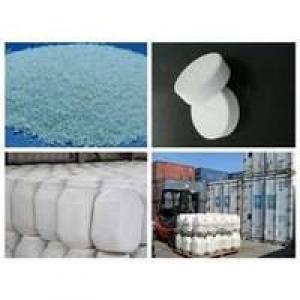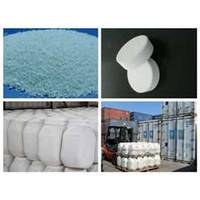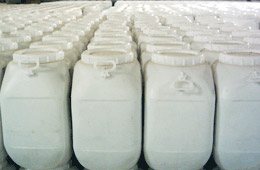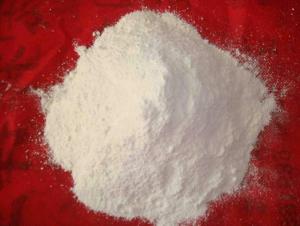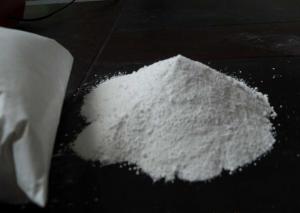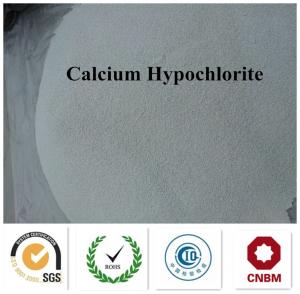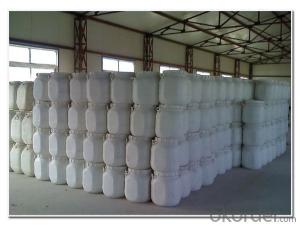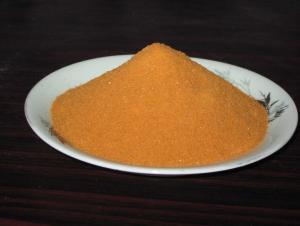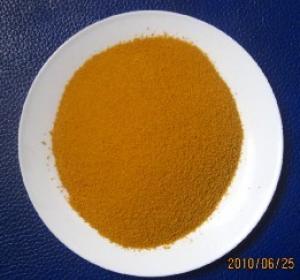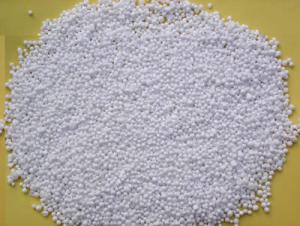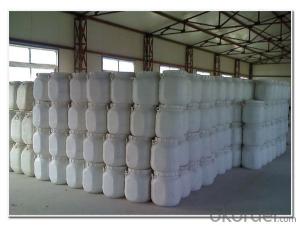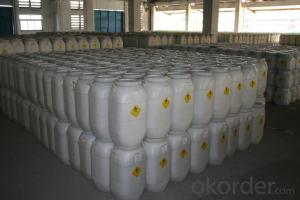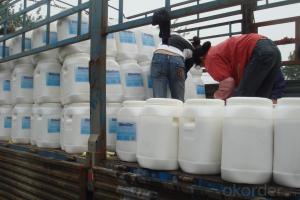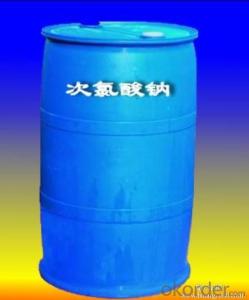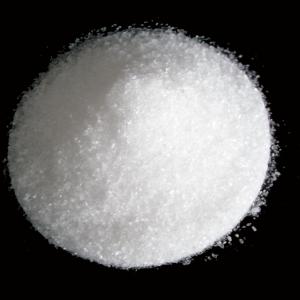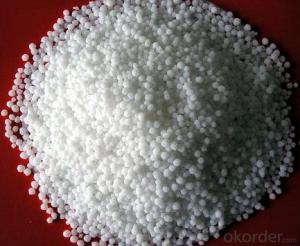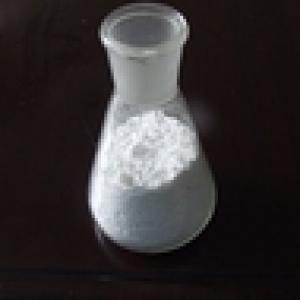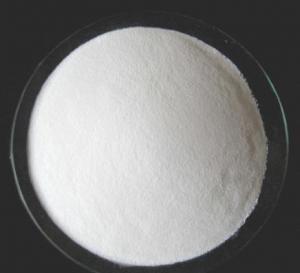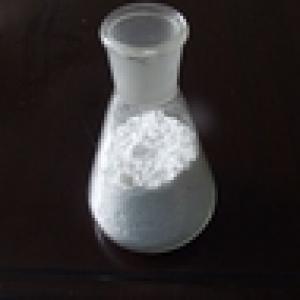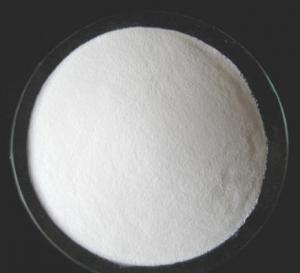Calcium Hypochlorite Granular For Water treatment
- Loading Port:
- Tianjin
- Payment Terms:
- TT OR LC
- Min Order Qty:
- -
- Supply Capability:
- 2000 m.t./month
OKorder Service Pledge
OKorder Financial Service
You Might Also Like
Calcium Hypochlorite
Introduction:
CNBM GROUP is the biggest water Treatment Factory in China. Our Product include: Calcium Hypochlorite, TCCA, SDIC, PAC, Sodium Sulphite, Sodium Thiosulfate etc.
CNBM One year can produce 18,000MT Calcium Hypochlorite with two model, one is 65% and one is 70%. More important we have 3 advantages, Firstly: High effective chlorine content Secondly: Good stability. Can be stored a long time at normal temperature with little chlorine loss; Third:Good solubility, less water-insoluble matters.
Technical Specifications:
Calcium Hypochlorite 65%
Index Name | Top Grade | First Grade |
Chlorine Content ≥ | 65% | 60% |
Moisture ≤ | 3% | 3% |
Yearly Loss of Active Chlorine | 8% | 8% |
Calcium Chloride | 9% | 10% |
Color | White or Light-grey | ----- |
Shape | Power & Granular |
|
Calcium Hypochlorite 70%
Index Name | Top Grade | First Grade | Quality Product |
Chlorine Content ≥ | 70% | 67% | 65% |
Granularity(14-50 mesh)% ≥ | 90 | 87 | 87 |
Moisture % | 5.5~10 |
|
|
Tablets Forms
Weight | 200 gram | 150gram | 100gram | 50gram | 30gram | 20gram | 15gram | 10gram |
Diameter(mm) | 76 | 70 | 50 | 42 | 30 | 30 | 30 | 30 |
Height(mm) | 25 | 21 | 26 | 27 | 22 | 16 | 12 | 8 |
Applications:
1. For bleaching purpose of wood pulp, silk, cloth and fibre.
2. Disinfection and water-treatment.
3. Disinfectant for chemical poisonous and radioactive substance.
Formula Experiment Design: (Base on 1MT Water)
Constitue Dosage
Calcium Hypochlorite 65% 100kg
Disinfection Liquid 1% Calcium Hypochlorite 65% 1.7g
Shipping Containers:
45—50kg Plastic or Steel Drums with Inner Plastic Bag.
Cautions
1. Should be stored in cool and dry warehouse away from heating sources and avoid direct sunlight.
2. In transportation, contact with such should be avoided as sunlight, heating,moisture, organics, oil and acids.
Other Information please check the MSDS.
- Q: anybody here knows the difference of organic iron salt (ex. F.gluconate) vs inorganic (ex. F.sulfate)?
- It it's organic, then the anion (the negative ion) is the conjugate base of an organic acid. If it's inorganic, then the original acid was inorganic (like H2SO4 making sulphates).
- Q: give me at least 5 substances
- Inorganic Bases
- Q: Is the conduction of excitement on neurons related to inorganic salts?
- Neurons, also known as nerve cells, constitute the basic unit of the nervous system structure and function.
- Q: Octopus why the lack of boron-containing inorganic salts can cause rape to flow only without fruit
- Boron has a great influence on the reproductive process of plants, which can accelerate pollen differentiation and pollen tube elongation. In the absence of boron, pollen tube germination is affected, poor fertilization, which leads to the formation of seeds affected, the reduction of growth hormone produced by the reduction of growth hormone will affect the formation of fruit.
- Q: Does the milk contain inorganic salts?
- Calcium, phosphorus, potassium .1L milk can provide 1g of calcium, and milk calcium and phosphorus ratio of 1.2: 1, close to human milk (human milk 1: 1), digestion and absorption rate, it can ensure that the baby's calcium Need milk milk in the very few, only 0.2mg / 100g, for the human milk 1/5, the baby, such as milk-based food feeding, the need to timely add iron and vitamin C foods such as egg yolk, liver mud, In addition, the milk also contains copper, zinc, manganese, iodine, molybdenum and other trace element
- Q: How to isolate the effects of inorganic salts on enzyme solubility
- Most enzymes are proteins, and high concentrations of inorganic salts can denature the protein and precipitate. The enzyme can be separated by this principle.
- Q: How can experiments prove that there are inorganic salts in the leaves of plants
- The experimental leaves used to dry, crushed into powder or sintered ash, and then the analysis of mineral elements, we can learn.
- Q: Does the lack of inorganic salts cause convulsions?
- The lack of important substances in the salt body is indeed the use of salt to protect the health of important substances than the calcium and phosphorus main body bone calcium blood coagulation muscle contraction and nerve cell regulation very important phosphorus calcium with the same function of food are preserved phosphorus body lack of calcium muscle spasms Can be rash dyspnea gastrointestinal paralysis and other body no phosphorus calcium calcium phosphate can be used to make bone calcium and phosphorus with a reasonable reason to play its role in the use of salt my body's non-essential body about 50 grams of salt according to 0 --- 2 5 grams To follow the excreta outside the body need to be added or otherwise the body of the production capacity of the body is extremely lack of salt can be fainting disease to speed up or even cause muscle weakness in the iron content and its role is not important in vivo iron deficiency anemia and other iron deficiency
- Q: I am 18 years old, test the body of inorganic salt content of 3KG, people say that low. What is the value of this use? How can improve it?
- The percentage of inorganic salts in human mass is 4 to 5%
- Q: Does the apple contain inorganic salts and vitamins?
- Yes, the fruit is rich in these two nutrients, especially apples
Send your message to us
Calcium Hypochlorite Granular For Water treatment
- Loading Port:
- Tianjin
- Payment Terms:
- TT OR LC
- Min Order Qty:
- -
- Supply Capability:
- 2000 m.t./month
OKorder Service Pledge
OKorder Financial Service
Similar products
Hot products
Hot Searches
Related keywords
